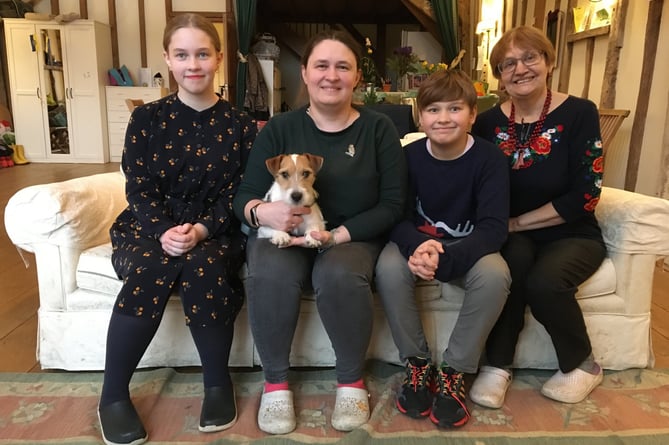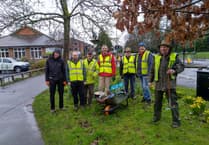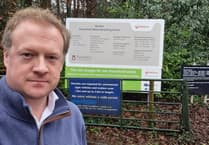Peach’s story of his journey to Britain begins at home in the outskirts of Kyiv, about 10km from Bucha. But he almost didn’t make it, writes Tony Souter.
Peach is a two-year-old Jack Russell and was a birthday present for Gregory, ten, who declared at their first meeting: “He’s going to be a peach.”
So, he’s been Peach – or ‘Persyk’ in Ukrainian – ever since.
Other family members – dad Misha, mum Olga, Maria, 12, Gregory and grandma Titiana were in their apartment a couple of days after the invasion on February 24, 2022 when a column of Russian tanks and armoured personnel carriers were spotted manoeuvring very close to their apartment block.
Maria remembers: “We were really scared – in nearby Bucha we had heard rumours of dreadful atrocities carried out by Russian soldiers on Ukrainian men.
“The headteacher of my school lived in Bucha – she and her family managed to escape to another town but her house was completely destroyed.”
Formal schooling ceased for Maria and Gregory but continued online for a while.
Food soon began to be in short supply as the area was surrounded by Russian military, and shortages continued until some Ukrainian volunteers braved the cordon and brought in some much-needed bread.
By then it was clear to Olga’s husband Misha that it was becoming unsafe and the family needed to try to relocate out of the country.
His work had dried up so he was without an income, there was no school apart from a limited service via Zoom and accordingly life was becoming increasingly difficult.
So in April the family, with Peach – but minus Misha, who stayed behind to look after his ageing mother – got on a train to the Romanian border in the south-west of Ukraine. There they were met warmly by “really kind” Romanian volunteers, Olga recalls.
The family were accommodated with other Ukrainian families in a monastery in the mountains for around a month. All the clergy there were vegetarian so there was no meat for Peach or anyone else!
Olga used the time to contact a Ukrainian friend in London who got the family’s UK visa application under way. After a month of waiting, they travelled by train to the Romanian capital Bucharest and then to the UK by plane.
But sadly, not Peach – nor grandma!
Peach’s documentation was incomplete and he wasn’t allowed to travel. So grandma Titiana came to the rescue and stoically volunteered to stay behind until things were sorted out.
They were both put up by a “wonderful” Romanian family for the month and half it took Olga to obtain and send through the correct papers for Peach.
Titiana and Peach then embarked on an adventure of their own, travelling by plane to Paris then by train to Lille and then Calais where the two of them were collected by a taxi which had been sent from the UK by their host family.
Peach, however, had to endure a week’s quarantine before joining everybody else at their new home near Alton.
They now live in a converted barn and Maria says: “Our place is so beautiful, we are so lucky!”
Both Olga’s children have found it easy to make friends at their respective local schools helped, no doubt, by their excellent grasp of English. Maria, especially, could pass as a local!
When speaking about her new friends at school, she says excitedly: “I met Betty, the best friend I’ve ever had. She understands me – and helps me with my English. She even came to my place for a sleepover the other day.”
Both Maria and Gregory say that when the time eventually comes to return to Kyiv, they will find it difficult to leave their new friends behind.
“For me and Gregory, it’s a bit like a holiday,” Maria admits – although events in Ukraine are never far from her thoughts, and in particular her father Misha.
“I’m very worried about my dad,” she says.
Olga admits that if it wasn’t for her children, she would have stayed in Kyiv.
Now, though, she is anxious that Maria and Gregory should finish the school year here in the UK before considering a return. And then, only when it’s safe, of course.
Everyone in the family is insistent they must get the whole of the occupied territories back from Russian occupation, and are prepared to endure a long conflict to be able to achieve that aim.
Collectively, they say: “Ukrainians don’t want to give anything to Russia.”
Asked about the trauma the war might have visited upon her children Olga, a practicing psychotherapist back in Ukraine, is pragmatic. “They have grown up very fast while some adults have gone in the opposite direction.”
Maria, betraying wisdom beyond her 12 years, says: “My mind is much bigger now, meaning children have become older, if that makes sense, while my mother has become smaller and gets upset and cries sometimes. We support her by giving her a big hug.”
Only grandma watches the news from home on the television. The others find it too distressing.
Olga has created a dedicated hotline for Ukrainians who are struggling with the fallout from the conflict, running counselling sessions via Zoom for those remaining in the country as well as the Ukrainian diaspora as far away as the USA and Canada.
PTSD and separation anxiety from families, like Olga’s, which have been torn apart feature regularly in the sessions. Olga also puts in a shift at the pub near where she lives.
Music is an acknowledged therapy and members of the family play regularly in the orchestra at the Farnham Music & Drama School. They also hope to take in a classical concert or two at the wonderful Anvil venue in Basingstoke.
As Peach settles down for a snooze on the sofa, it’s worth repeating Maria’s appreciation for the lengths to which their British friends and supporters have gone to make them feel at home.
“Our place here is so beautiful – we are so lucky.”
Donate to the JustGiving webpage at: https://www.justgiving.com/crowdfunding/energiseukraine




